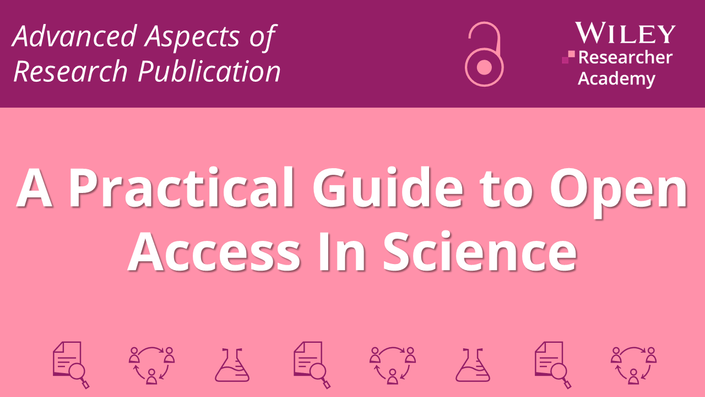
A Practical Guide to Open Access In Science
Understand and explore the opportunities to make academic publications more open
What will you learn?
- Understanding traditional and open access models of publishing
- The 4 building blocks of Creative Commons licenses
- The difference between Gold and Platinum open access
- Factors that influence APCs and obtaining financial support for it
- Various open access funding models and their advantages
- Understanding the pros and cons of open access publishing
- Types of open access, how to archive content, and exploring repositories
- Using the DOAJ to locate high-impact open access journals
- Understanding the different categories of open access publishers
- Strategies for identifying and avoiding predatory journals
Description:
The growing popularity of open publishing, open access, and data sharing makes it essential to understand open science concepts, its importance, and its role in the global research community.
In this course, you’ll get a detailed overview of the advantages and implications of open access. From its emergence to current trends, you will cover all essential elements of open access through interactive videos, in-depth explanations, and practical assessments. You’ll learn about institutional policies, emerging OA models, and how to protect your research from predatory journals. This course will also expose you to special tips and tools required to identify high-impact open access journals, help you understand different categories of OA publishers, and teach you how to get funding support for APCs.
About the course author
Guido Kemeling
Guido Kemeling pursued M.Sc. in Chemistry from Utrecht University. He has worked for more than ten years at Wiley-VCH as the Editor-in-Chief of the journals ChemSusChem and Energy Technology, specializing in the chemistry and materials science behind renewable resources, energy, and sustainability. Guido has built a solid foundation of expertise in all aspects of publishing, including open access publishing. Currently, he is the Associate Director, Medical Communications Excellence & Innovation at Merck Group.
Your Instructor
Are you an early career researcher seeking to improve your research writing skills? Are you an established researcher who wants to better understand the scholarly publishing landscape? Wiley Researcher Academy has the tools you need to navigate the publishing process and increase your chances of achieving a successful publishing outcome.
Written and presented by a global network of journal editors and industry experts from Wiley's prestigious scientific publishing portfolio, Wiley Researcher Academy provides an authoritative source of training and enablement to help researchers at any level achieve their full potential.
This course is exclusively available for institutions. Contact us to learn more.
Leave your email to get notified when this course becomes available for individuals.